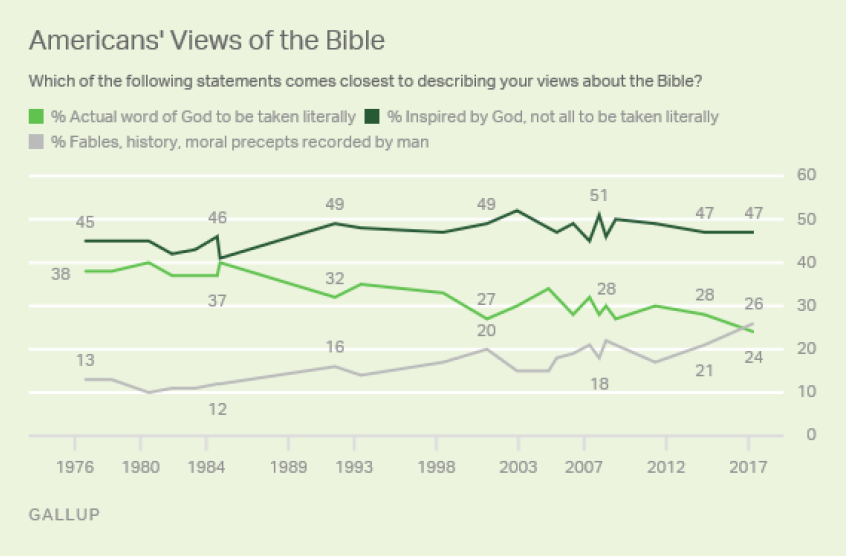
A recent study suggests that most Americans believe the Bible is divinely inspired, but fewer than ever take it literally.
It's an important poll that shows that the number of people who say that Scripture is 'the actual word of God, and is to be taken literally, word for word' is at a 40-year low (24 per cent).
More Americans (26 per cent) now believe 'a book of fables, legends, history and moral precepts recorded by man' to be a better description of the Bible.
Before conservatives despair at encroaching liberalism however, it's worth noting that since just under half (47 per cent) of Americans believe the Bible is 'inspired by God, not all to be taken literally', 71 per cent of Americans still believe Scripture to be divinely inspired.
What does all this mean? On one hand, the stats suggest a perhaps surprising level of reverence for the Bible in a nation where broadly, the Christian religion is in decline. Even more interestingly, America is letting go of biblical literalism. Here's why.
1. People are literally confused
One puzzle hanging over this poll is the question of what 'literally' even means. Do the 24 per cent who say the Bible is the 'actual word of God' reject evolution as an explanation of creation, and believe creation to have been a literal six-day event, occurring only thousands, not billions, of years ago? That's quite likely, though across the Church, creationism is losing its appeal.
What of Scripture's many metaphors and poetic forms? Does taking them 'word for word' refuse to admit their linguistic intent?
There's helpful clarity on this question provided by the biblical scholar Prof Iain Provan of Regent College, Vancouver. Provan says Christians should take the Bible literally – just not literalistically.
He said: 'We must differentiate between literal readings and literalistic. A literalistic reading understands "pitching a tent" to require throwing it.'
A proper 'literal' reading focuses on the author's actual intent in the given text, amid all its grammatical and stylistic complexity. Provan reads the Bible 'literally' but that doesn't mean he's a creationist, or ignores the Bible's many diverse literary layers of meaning.

2. Beyond the Bible?
That clarification aside, there's an obvious cultural trend here: across America, people are increasingly dissatisfied with flat and shallow readings of Scripture. On one hand, irreligion has grown, as has religious pluralism, so in an increasingly diverse nation it's not surprising that fewer people see the Bible as the 'actual word of God'. But even inside the Church, the dominant view is the more nuanced one: the Bible is 'inspired'.
For many, it's because they take the Bible more seriously, not less. Rather than selling out to cultural values, many Christians have found Scripture to be too holy, inspired and complex to be merely taken 'word for word'.
For example, do the psalms portray the 'actual word of God'? They clearly give human voices, offering profound insight into human spiritual experiences. They teach the Church how to sing. They're certainly inspired by God and have authority, but they're more complex than a simple compendium of divine dictation.
A deeper awareness has developed about Scripture's purpose. It's not just a spiritual encyclopaedia or an extended history book – it's a story to be invited into. Do any of its accounts contradict each other? Did every event happen exactly as described? That's still debated, but many accept that that isn't the ultimate point. It's not merely about facts, but exists to challenge and transform the people of God. Calling the Bible 'inspired' does better justice to what it's truly for.
Wider cultural developments have certainly played a role too. Popular understanding of science, and its understanding of our world, has transformed people's thinking in the past century, and continues to. Since science is the study of God's world, that's no bad thing.
Whether it's the age of the earth, or progress on social justice and equality, people see there are important 'truths' to be learned about the world that aren't necessarily made explicit in Scripture. The Bible's ambiguity about slavery is a classic example. It's not about rejecting the Bible, but recognising different sources of knowledge through which God speaks.

3. People still want the Word
The poll ultimately finds that most Americans still hold the Bible to be divinely inspired. Somewhat bafflingly, even for those with 'no religion', seven per cent still believe the Bible to be the 'actual word of God'. Polling language can confuse people, and on an issue as complex as Scripture, ticking one box can be difficult. It's possible that some chose 'actual word of God' despite not (literally) being literalists; they simply reacted against purely human or 'liberal' accounts of Scripture.
But even the least conservative option, describing Scripture as 'a book of fables, legends, history and moral precepts recorded by man', is not necessarily unChristian. Most Christians do believe the Bible was recorded by men (possibly women too), and contains an array of rich literary genres. They just also believe those words to be inspired by God.
Just as ancient creeds describe Christ as 'fully human and fully divine', many ascribe the same idea to the Bible. It is the words of human beings, formed through their minds and complex experiences, and heard through imperfect human translations – and it is also God's special word to the world.
Even in a country that may not be as 'Christian' as it once was, 71 per cent of people still see the Bible as inspired inspiration. Language, as the Bible shows, has its limits in explaining divine action. What's clear is that across most of America, people still want the word.
You can follow @JosephHartropp on Twitter













